Why Is My Cat Coughing So Much? And How To Help?

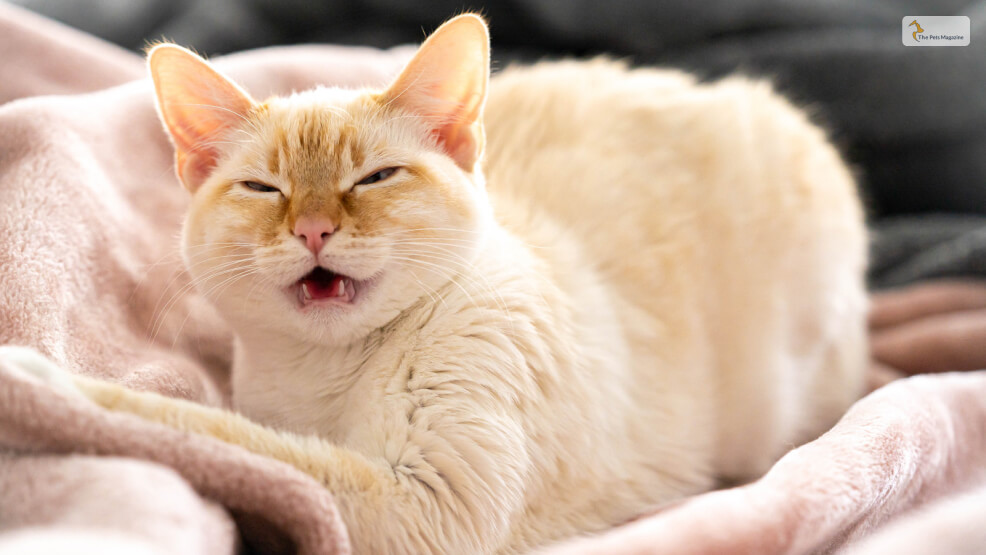
It can be quite distressing for you if you see that your cat is coughing, it can be quite worrying. In this situation, it is also natural for you to wonder the causes of cat coughing, and what you can do to help? The best option for you is to immediately take your cat to your veterinarian. But if you still want to know why your cat is coughing, then keep on scrolling.
Do Cats Cough? Why Is My Cat Coughing?
Yes, It is important to know that cats and other animals cough. In fact, cat wheezing and even cat dry heaving to pass a hairball is quite a normal thing. However, a cat coughing up hairballs is sometimes considered to be the same as a respiratory cough.
However, respiratory cough is very different. It happens due to response to irritation in the respiratory tract, which includes the throat, airways, and lungs. However, it’s not very common for cats to cough frequently. If your cat is coughing often, it might indicate underlying health issues.
Why Is My Cat Coughing: Possible Causes of Cat Coughing
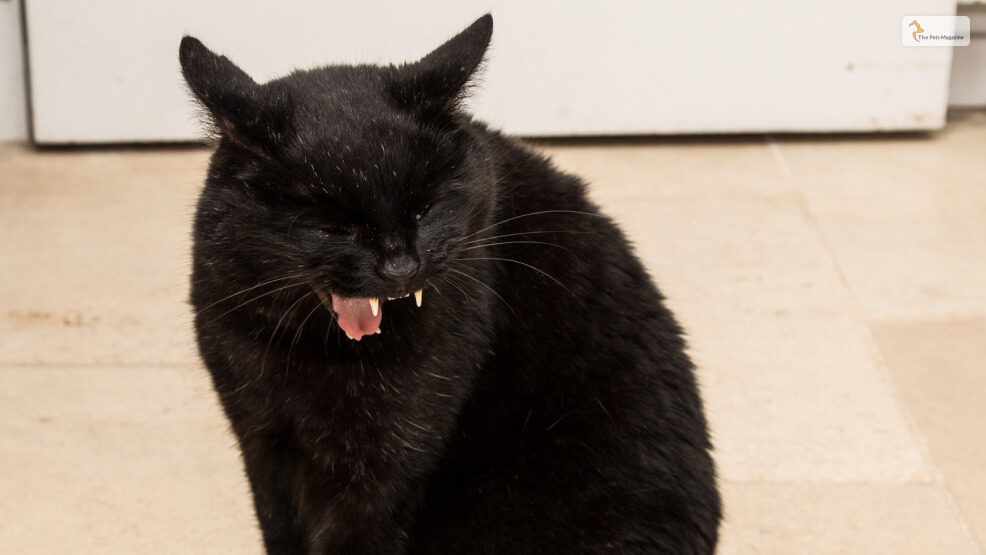
There are many plausible causes as to why my cat is coughing and sneezing. So, in the list below, there are some possible reasons or causes for your cat’s coughing.
1. Asthma
It is important to know that if a cat has asthma, then it is due to the narrowing of its airway due to mucus and or swelling in the airway. This narrow airway can be a trigger for them to start coughing.
2. Respiratory Infections
There are many viral and bacterial respiratory infections that can cause coughing in cats. Respiratory infections can be caused due to parasites or some kind of fungal infection.
3. Inhaled Foreign Objects
It is possible that due to eating or inhaling something foreign object, the object can be something like solid food, grass, or even a piece of stick, that is lodged in the through.
4. Trauma
There is a possibility that if the cat has been in a traumatic situation, and suffered either physical, thermal, or chemical injury to the airways, then coughing is a sign of that.
5. Cancer
Although less likely to happen, coughing can be a sign that your cat is showing symptoms of cancer. So it is better to consult the vet as soon as possible.
How Is The Cause Of A Cat’s Cough Diagnosed?
Whether a cat’s cough is something serious or ignorable can be difficult to tell. But no matter the severity of the cough, if you see it is continuing for some time, then it is a matter of concern.
It is important that after a few days of coughing, you should definitely go to the vet. Only after a thorough medical examination can it be known how to go forth with the cat coughing.
The diagnosis would require different types of tests like x-rays and blood work to determine the cause of the coughing. With all the texts, it can be easily determined if your cat has any serious condition or not.
Can Cats Get Kennel Coughs From Dogs?
Unlike cats, Dogs can get infected by various viruses. These viruses can lead to Kennel Coughs in dogs. Kennel Cough or Bordetella bronchiseptica, parainfluenza, mycoplasma, adenovirus type 2, canine coronavirus, etc., can be some of the causes of Kennel Cough. Sometimes, Kennel cough can be due to multiple viruses, and not just a single virus.
Now, can your cat get Kennel Cough from your dog? The answer is yes as well as no. Some cats can be especially susceptible to certain viruses like Bordetella bronchiseptica. Therefore, if your dog has developed Kennel Cough due to the said virus, then your cat might get it as well.
How does Kennel Cough spread?
We have listed some of the common ways in which your cat can get infected:
- Direct Contact: Cats can catch kennel cough through direct contact with an infected dog or cat
- Shared Items: The bacteria can also spread via contaminated objects like food, bowls, toys, and bedding.
- Airborne Transmission: In enclosed spaces with poor ventilation, the bacteria can spread through the air.
Symptoms of Kennel Cough in Cats
Keep a look out for the following symptoms if you suspect that your cat has been infected with kennel cough:
- Coughing: Similar to dogs, cats may develop a persistent cough.
- Sneezing: Frequent sneezing is another common symptom.
- Nasal and Eye Discharge: Cats may have runny noses and watery eyes.
- Lethargy and Loss of Appetite: Affected cats might be less active and show reduced interest in food.
The only way to proceed is to quarantine the pet who is coughing, sneezing, or has discharge from their eyes and nose. This would make sure that other animals in your household remain safe and healthy. You also need to consult your veterinarian for proper diagnosis and treatment.
Wet Cough Vs. Dry Cough In Cats
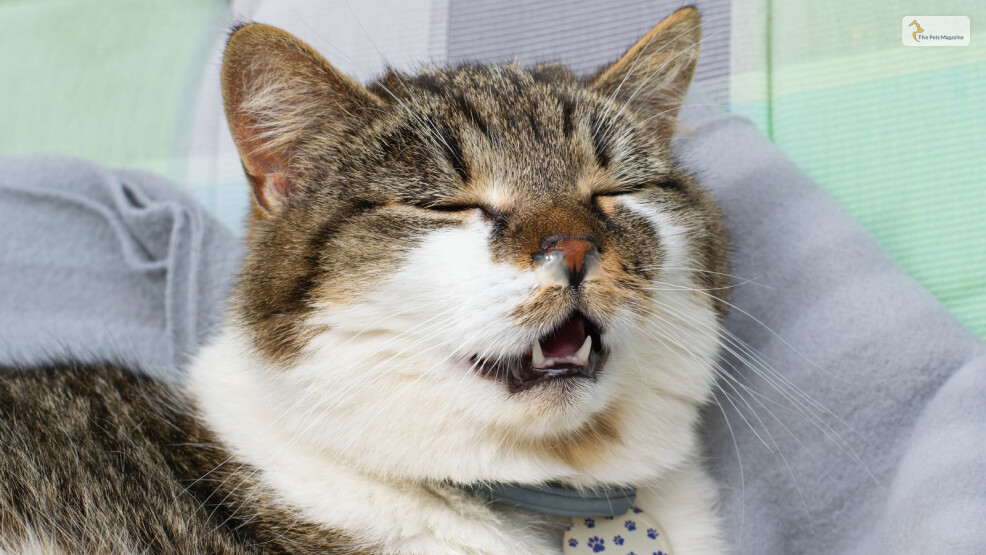
When it comes to respiratory coughing in cats, you should understand that there are two types of coughing that your cat might contract. We have explained these two types of cat coughing in detail:
Understanding the difference between wet and dry coughs in cats can help you and your vet determine the underlying cause and appropriate treatment.
Dry Cough
A dry cough in cats sounds like a scratchy, hacking noise. It often seems like the cat is trying to clear something that isn’t there. Irritation or mild respiratory issues, such as asthma or allergies, can cause this type of cough. In the case of dry cough, mucus production is present, which is why the cough may sound wheezy or honking.
Wet Cough
A wet cough sounds more like a gurgling or bubbling noise. It may seem like there is fluid in the cat’s lungs or throat. This type of cough is often associated with more serious conditions, such as infections, pneumonia, or fluid accumulation in the lungs (pleural effusion). One of the most common symptoms of wet coughing in cats is mucus production and you might also hear crackling sounds. They often swallow after coughing.
If your cat is coughing, it’s important to observe the type of cough and any other symptoms. This information can be very helpful for your veterinarian in diagnosing and treating the issue.
Associated Symptoms With Cat Coughing
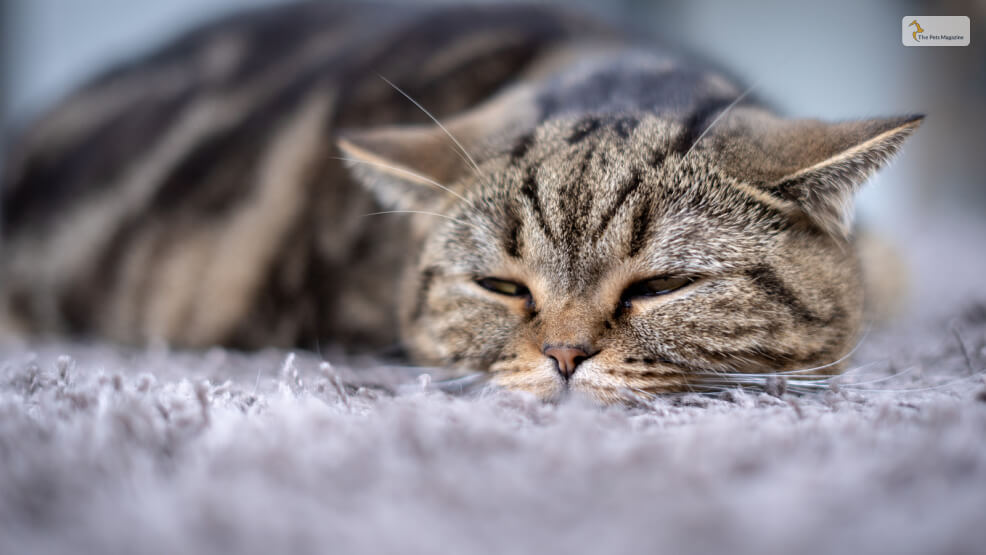
In general, coughing in cats is usually coupled with several other factors. Knowing these ancillary factors greatly influences the overall diagnosis. Hence, let us look at some of these ancillary factors as well. So, let us look at some of them so that you can take more informed steps when your cat is coughing constantly.
Coughing and Sneezing
If your cat is essentially coughing, coupled with sneezing, this could relate to an upper respiratory infection. Infection of the nasal cavity can cause sneezing, snooty nose, etc. This condition is essentially manageable. But if you feel like your feline is having issues while breathing, then you should immediately take your cat to the vet for a checkup.
Coughing And Wheezing
Wheezing while coughing is a sign that there is no discharge in the pulmonary system. Hence, this is a sure-shot sign that your cat has developed asthma. Some of the signs that you need to look out for are incessant coughing, open-mouth breathing, wheezing, fatigue, etc. This could be a chronic disease and should be dealt with accordingly.
Coughing up Hairlballs
If your cat coughs up hairballs, this is not at all an alarming sign. In fact, this is absolutely normal for cats. While this certainly sounds a lot like coughing, what your cat is doing is retching or gagging to get that hairball out. This is a common phenomenon among cats, and you should not be concerned at all.
How Do Vets Diagnose the Cause of Cat Coughing?
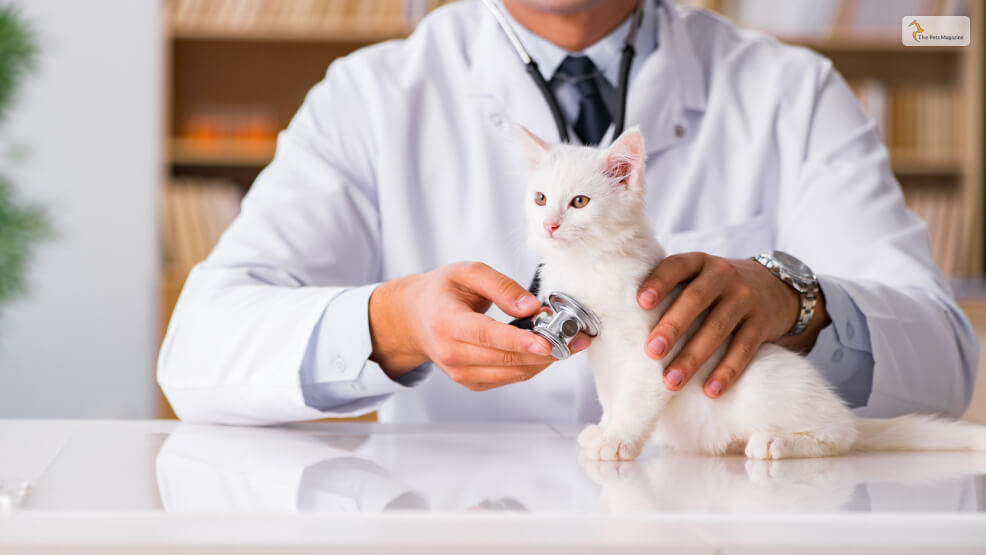
Whether a cat’s cough is something serious or ignorable can be difficult to tell. But no matter the severity of the cough, if you see it is continuing for some time, then it is a matter of concern.
If you see your cat coughing continuously for a few days, you should definitely go to the vet. They will perform a thorough physical examination and may also get different types of tests like x-rays and blood work done to determine the cause of the coughing.
How Do Vets Treat Cat Coughing?
“It is important not to stop the treatment once the cat seems better.”
After the diagnosis, it is important that you start treatment for your cat as soon as possible. If the reason for your cat coughing is something serious, then treatment should start immediately.
Medicines like antibiotics and anti-bacterial are usually prescribed for two weeks, or maybe more. But it is important to know that once the treatment and medication have started, it should not be stopped.
But if the condition is more severe, then the treatment can last longer, as long as two months. Such chronic problems can damage the mucous membrane and even affect the immune system.
Now that you know why is your cat coughing, then you will understand that coughing is not always something serious. But if you are worried about your cat coughing, then you should definitely contact your vet immediately at once. They can advise and guide you regarding the next course of action.







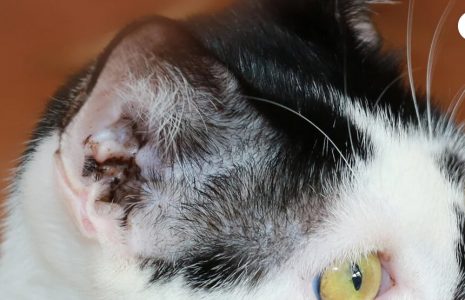

Leave A Comment